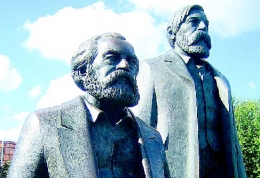“When sorrows come, they come not single spies but in battalions” – so spoke a morose Claudius in Shakespeare’s Hamlet. Claudius was a usurper of power; a liar, a murderer and a cad. His sad realisation that the shadows of his nemesis were encroaching could well epitomise the sorry predicament of an entire nation, one that has overdosed on its own villainous fantasies. I’m talking of course of Ireland.
 Friedrich Engels – that inimitable German philosopher, revolutionary and gifted Gaelic scholar – travelled all over Ireland in the mid 19th century. He and his colleague Karl Marx were deeply sympathetic with the plight of Ireland’s starving peasants.
Friedrich Engels – that inimitable German philosopher, revolutionary and gifted Gaelic scholar – travelled all over Ireland in the mid 19th century. He and his colleague Karl Marx were deeply sympathetic with the plight of Ireland’s starving peasants.
Engels lived in Manchester with an Irish Fenian woman by the name of Lizzy Burns and counted Irish among the 16 languages he mastered. He went to Ireland as part of his research for a book on the country’s history. The fragments of that work, and his many numerous epistolary exchanges with Marx, reveal an extraordinarily deep understanding of the Irish psyche.
It was clear to Marx and Engels that Ireland’s failure to develop was due to two key factors that were intricately related: the British Imperial State, that is to say capitalism, and the Catholic Church. Since Pope Adrien IV’s notorious Papal Bull to Henry II of England in 1555 – encouraging him to invade and colonise Ireland in order to bring that rebellious land into the fold of the Roman Church – Catholicism had always used and abused the Irish people.
For centuries, the Catholic Church remained the chief bulwark against Irish emancipation, rendering the illiterate peasants helpless with superstition and psychological terrorism.
Much is made in Irish schools about the horrors of the Penal Laws after the Battle of the Boyne in 1690, but while there is no doubt that Protestants persecuted Irish peasants who had the misfortune to be Catholic, one could say that the laws did not go far enough, as they failed to rid Ireland of the baleful influence of Roman popery.
Such was the failure of the Irish Protestant strategy that when the time came to unite the Ireland against our geo-political oppressor, the Church opposed the heroic actions of the United Irishmen.
It was the Presbyterians of the North under Henry Joy McCracken and the Protestant intellectuals of the South under Wolfe Tone and Arthur O’Connor who formulated the notion of an Irish Republic. These were men of the Enlightenment whose ideology transcended the petty bigotries of the Catholic Church and the Ulster Orangemen. Needless to say the Catholic Church opposed them; they always opposed progressive emancipatory politics.
Having fought for Irish independence with the lives of our best and brightest, we then handed our freedom over to the pernicious Catholic Church, proving the suspicions of the Ulstermen that Home Rule would be “Rome rule”.
Sure, we tolerated Protestants – Douglas Hyde and others went on to have distinguished careers in the Irish State – but we were too weak-minded, too cowardly, too pathetic to face the responsibility of forging a real republic.
There would be no revolution in Ireland. Such a revolution would have required resolute willpower and a steely intellect. Such a revolution would have again raised the issue of the Penal Laws, this time targeting the Catholic hierarchy in the interests of the Irish people.
The failure of Irish independence was our refusal to reverse the terror exerted by that institution on our people by punishing them and removing them from Ireland once and for all. Instead, the Irish bourgeoisie consigned our nation’s poor children to decades of pure terror at the hands of the Church’s paedophile sadists. Having expelled our geo-political enemies, the colonisation of our minds was only just beginning.
Now in today’s sorry times, Marx and Engels’ estimation of Ireland is more relevant than ever before. Engels was pessimistic about the future of this land; he wrote: “The worst about the Irish is that they become corruptible as soon as they stop being peasants and turn bourgeois. True, this is the case with most peasant nations. But in Ireland it is particularly bad.”
Has not the failure of capitalism and the bane of religious control in Ireland not proved Engels right in these miserable times of pension cuts, mass unemployment and our children’s schools – after all the revelations, after all the unspeakable crimes against humanity – still under the patronage of the Vatican?











